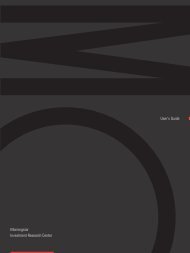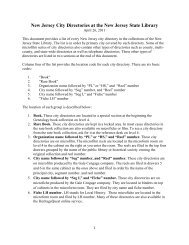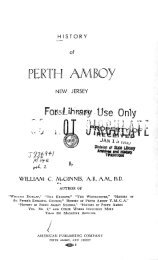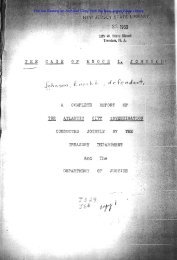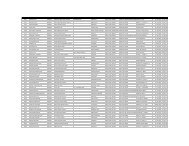- Page 3:
IRFAU OF STATISTICS01' I,AI;".R AND
- Page 7 and 8:
Contents.PAGE.INDEX TO SUBJECTSLETT
- Page 9 and 10:
CONTENTS,PART V.—Co-operative Bui
- Page 11:
CONTENTS.viiPART VI.—Labor Legisl
- Page 14 and 15:
INDEX.Building and Loan Association
- Page 16 and 17:
xiiINDEX.Building and Loan Associat
- Page 18 and 19:
xivTMDKX.Census Returns, 189O, U. S
- Page 20 and 21:
xviTN1)EX -I'AOgLand, Improved, in
- Page 23 and 24:
STATE OF NEW JERSEY, OFFICE OF BURE
- Page 25 and 26:
Introduction.On the second day of A
- Page 27 and 28:
INTRODUCTION.xxiiisummary of the re
- Page 29:
PART I.U. S. Census Returns1890
- Page 32 and 33:
4 STATISTICS OF LABOR ANI. TNI.USTK
- Page 34 and 35:
STATISTICS OF LABOK AND [NDUSTIUES.
- Page 36 and 37: STATISTICS OF LABOR AND INDUSTRIES.
- Page 38 and 39: ISDCSTBY.NO. OF ESTABL1SBMEXTS.VALU
- Page 40 and 41: 12 STATISTICS OF LABOR AND INDUSTRI
- Page 42 and 43: 14STATISTICS OF LABOR AND INDUSTIUK
- Page 44 and 45: STATISTICS OF LABOR AND INDUSTRIES.
- Page 46 and 47: 18 SlATISTfCS OF IJAHOK ANDThese da
- Page 48 and 49: 20 STATISTICS OF L.MJOK AND INIM:ST
- Page 50 and 51: 22STATISTICS OF LABOK AND INDUSTRIE
- Page 52 and 53: STATISTICS OF LABOR AND INDUSTRIES.
- Page 54 and 55: 26 STATISTICS OF LABOR AJSTD INDUST
- Page 56 and 57: 84\n28 STATISTICS OF LABOR AND INDU
- Page 58 and 59: 30 STATISTICS OF LABOR AND INDUSTRI
- Page 60 and 61: 32 STATISTICS OF LABOR AND INIMJKTU
- Page 62 and 63: 34 STATISTICS OF LABOR AND INDUSTRI
- Page 64 and 65: 36 STATISTICS OF LABOR AND INDUSTRI
- Page 66 and 67: STATISTICS OF LABOR AND INPUSTUIKS.
- Page 68 and 69: 40 STATISTICS OP LABOR AND INDUSTRI
- Page 70 and 71: 42 STATISTICS OF LABOR AND INDUSTRI
- Page 72 and 73: STATISTICS OF LABOR AND INDUSTRIES.
- Page 74 and 75: 46 STATISTICS OF LABOR AND INDUSTRI
- Page 76 and 77: 48 STATISTICS OF LABOR AND INDUSTRI
- Page 78 and 79: 50 STATISTICS OF LABOR AND INDUSTRI
- Page 81: PART II.Social Developmentand thepu
- Page 84 and 85: 56 STATISTICS OF LABOR AND INDUSTRI
- Page 88 and 89: 60 STATISTICS OF LABOR AND INMJBTRI
- Page 90 and 91: 62 STATISTICS OF LABOR AND INDUSTRI
- Page 92 and 93: 64 STATISTICS OF LABOR AND INDUSTKI
- Page 94 and 95: 66 STATISTICS OF LABOR AND INDUSTRI
- Page 96 and 97: 68 STATISTICS OF LABOR AND INDUSTRI
- Page 99: PART III.Free Public EmploymentOffi
- Page 102 and 103: 74 STATISTICS OF LABOR AND INDUSTRI
- Page 104 and 105: 76 STATISTICS OF LABOR AND INDUSTRI
- Page 106 and 107: 78 STATISTICS OF LABOR AND INDUSTRI
- Page 109 and 110: PART IV.Woman's Work and Wages.Our
- Page 111 and 112: WOMAN'S WORK AND WAGES. 83It is sca
- Page 113 and 114: WOMAN'S WORK AND WAGES. 85employmen
- Page 115 and 116: WOMAN'S WORK AND WAGES. 87book-keep
- Page 117 and 118: WOMAN'S WORK AND WAGES. 89noted abo
- Page 119 and 120: 11 f 11f1139 Sif faIII .ffiio. g B
- Page 121 and 122: TABLE 1.—COLLATED STATISTICS FROM
- Page 123: 9 5 S 9*1111 Him ii s 5 * 51 s j nI
- Page 126 and 127: 98 STATISTICS OF LABOR AND INDUSTRI
- Page 128 and 129: TABUS 1.—COLLATED STATISTICS FROM
- Page 130 and 131: TABLE L—COLLATED STATISTIOS PROM
- Page 132 and 133: esoNumber rtoetnag55 55 5 5 55555 5
- Page 134 and 135: : : : ; Number receiving,j : '. :Av
- Page 136 and 137:
TABLE 1—COLLATED STATISTICS PROM
- Page 138 and 139:
TABLE 1.—COLLATED STATISTICS FROM
- Page 140 and 141:
i©t£ v< »-»••*.*,•.«.-a
- Page 142 and 143:
TABLE 2.—COLLATED STATISTICS FROM
- Page 144 and 145:
* * s?Illffjf.fiad08 8 S S 6 S 8Tot
- Page 146 and 147:
TABLB 2,—{JO&LATBD STATISTICS PRO
- Page 148 and 149:
TABLE 2. — COLLATED STATISTICS FR
- Page 150 and 151:
122 STATISTICS OF LABOR AND INDUSTR
- Page 152 and 153:
TABLE 2. —COLLATED STATISTICS PRO
- Page 154 and 155:
',126 STATISTICS OP LABOR AND INDUS
- Page 156 and 157:
128 STATISTICS OF LABOR AND INDUSTR
- Page 158 and 159:
130 •STATISTICS OF LABOR AND INDU
- Page 160 and 161:
132 STATISTICS OF LABOR AND INDUSTR
- Page 162 and 163:
STATISTICS OF LABOR AND INDUSTRIES.
- Page 164 and 165:
136 STATISTICS OP LABOR AND INDUSTR
- Page 166 and 167:
138 STATISTICS OF LABOR AND INDUSTR
- Page 168 and 169:
140STATISTICS OF LABOR AND INDUSTRI
- Page 171:
PART V.Co-operative Building andLoa
- Page 174 and 175:
146 STATISTICS OF LABOR AND INDUSTR
- Page 176 and 177:
148 STATISTICS OF LABOR AND INDUSTR
- Page 178 and 179:
1892. 1891. 1890. 1888COUNTIES.*Atl
- Page 180 and 181:
152 STATISTICS OF LABOR AND INDUSTR
- Page 182 and 183:
154 STATISTICS OF LABOR AND INDUSTR
- Page 184 and 185:
156 STATISTICS OF LABOR AND INDUSTR
- Page 186 and 187:
153 STATISTICS OF LABOR AKD INDUSTR
- Page 188 and 189:
160 STATISTICS OF LABOR AND INDUSTR
- Page 190 and 191:
162 STATISTICS OF LABOR AND INDUSTR
- Page 192 and 193:
164 STATISTICS OF LABOR AND INDUSTR
- Page 194 and 195:
166 STATISTICS OF LABOR AND INDUSTR
- Page 196 and 197:
168 STATISTICS OF LABOR AND INDUSTR
- Page 198 and 199:
I170 STATISTICS OF LABOR AND INDUST
- Page 200 and 201:
172 STATISTICS OF LABOR AND INDUSTR
- Page 202 and 203:
174 STATISTICS OF LABOR AND INDUSTR
- Page 204 and 205:
176 STATISTICS OF LABOR AND INDUSTR
- Page 206 and 207:
178 STATISTICS OF LABOR AND INDUSTR
- Page 208 and 209:
180 STATISTICS OF LABOR AND INDUSTR
- Page 210 and 211:
182 STATISTICS OF LABOR AND INDUSTR
- Page 212 and 213:
184 STATISTICS OF LABOR AND INDUSTR
- Page 214 and 215:
186 STATISTICS OF LABOR AND INDUSTR
- Page 216 and 217:
-»!?!iffIBO O OIS:5qIAverage amoun
- Page 218 and 219:
iwEv00, below, for totalt.00I E1IWa
- Page 220 and 221:
SUMMARY 2.—BUILDING AND LOAN ASSO
- Page 222 and 223:
=3* a0i i3t i SAverage number of sh
- Page 224 and 225:
SUMMARY 3.— BUILDINO- AND LOAN AS
- Page 226 and 227:
SUMMARY 4.—BUILDING- AND LOAN ASS
- Page 228 and 229:
SUMMARY 5.—BUILDING AND LOAN ASSO
- Page 230 and 231:
SUMMARY 5.—BUILDING AND LOAN ASSO
- Page 232 and 233:
204STATISTICS OF LABOK AND INDUSTRI
- Page 234 and 235:
• * *1206STATISTICS OF LABOR AND
- Page 236 and 237:
*$* I ifIssiLlMliEa^ sss §_».ii_i
- Page 238 and 239:
ss.Fr-I ? Illis sQi IO CO£ si! S_j
- Page 240 and 241:
SUMMARY 8.—BUILDING AND LOAN ASSO
- Page 242 and 243:
,9 sswg 2•H IS?! 19 0 OII?QQaCOtd
- Page 244 and 245:
SUMMARY a—BUILDINGJAND LOAN ASSOC
- Page 246 and 247:
PiIt8*3srhiir*• • 1 " • •:
- Page 248 and 249:
SUMMARY 8.— BUILDING AND LOAN ASS
- Page 250 and 251:
SUMMARY 8—BUILDING AND LOAN ASSOC
- Page 252 and 253:
SUMMARY 8.—BT7IU>INGr AND LOAN AS
- Page 254 and 255:
1 tng00 C* Oi "eft **-! "^1 ->l to
- Page 256 and 257:
SUMMAJRY 8.—BUILDING- AND LOAN AS
- Page 259 and 260:
uO g 32 S S£>5W2 wetor a41S|BIS;IS
- Page 261 and 262:
SUMMARY 9.—BUILDING AND LOAN ASSO
- Page 263 and 264:
SUMMARY 9.—BUILDING AND LOAN ASSO
- Page 265 and 266:
SUMMARY 9.—BUILDINa AND LOAN ASSO
- Page 267 and 268:
SUMMARY 10.—BUILDING AND LOAN ASS
- Page 269 and 270:
SUMMARY 1O.-BUILDING AND LOAN ASSOC
- Page 271 and 272:
organiIsite ofSUMMAEY 1O.-BUILDING
- Page 273 and 274:
IIP ** ^ O ® SWPSi!£ so =og5!6 pe
- Page 275 and 276:
SUMMARY 11.—BUILDING- AND LOAN AS
- Page 277 and 278:
SUMMARY 13.—BUILDING AND LOAN ASS
- Page 279 and 280:
11SUMMARY 12-BUILDING AND LOAN ASSO
- Page 281 and 282:
: • * •Salem 1 3Somerseto560 1t
- Page 283 and 284:
SUMMARY 14.—BUILDING AND LOAN ASS
- Page 285 and 286:
SUMMARY 14—BUILDING AND LOAN ASSO
- Page 287 and 288:
SUMMARY 15.—BTJIIiDING AND LOAN A
- Page 289 and 290:
CO-OPERATIVE BUILDING AND LOAN ASSO
- Page 291 and 292:
CO-OPERATIVE BUILDING AND LOAN ASSO
- Page 293 and 294:
B UILDIN0 ANDj NUMBER OPSERIES.SERI
- Page 295 and 296:
COOPERATIVE BUILDING AND LOAN ASSOC
- Page 297 and 298:
§Bg§gggggc £"5'§ H.§§iFrequen
- Page 299 and 300:
CO-OPERATIVE BUILDING AND LOAN ASSO
- Page 301 and 302:
CO-OPERATIVE BUILDING AND LOAN ASSO
- Page 303 and 304:
CO-OPERATIVE BUILDING AND LOAN ASSO
- Page 305 and 306:
CO-OPERATIVE BUILDING AND LOAN ASSO
- Page 307 and 308:
fcSHIgillSSSSc *rr? m casesSB D (3
- Page 309 and 310:
1CO-OPERATIVE BUILDING AND LOAN ASS
- Page 311 and 312:
TABLE 2 —BUILDING AND LOAN ASSOCI
- Page 313 and 314:
TABLE 2—BUILDING AND LOAN ASSOCIA
- Page 315 and 316:
Offloa number.'Itoif!.*- : s»S_¥s
- Page 317 and 318:
•SNOUVioossyQNV omening;
- Page 319 and 320:
TABLE 2—BUILDING AND LOAN ASSOCIA
- Page 321 and 322:
Offlee number.>idto*iI.8 8 S | B.S
- Page 323 and 324:
TABLE 2—BUILDING AND LOAN ASSOCIA
- Page 325 and 326:
TABLE 2-BUILDING AND LOAN ASSOCIATI
- Page 327 and 328:
TABLE 2—BUILDING AND LOAN ASSOCIA
- Page 329 and 330:
TABLE 2 — BUILDING AND LOAN ASSOC
- Page 331 and 332:
TABLE 2~ BUILDING AND LOAN ASSOCIAT
- Page 333 and 334:
TABLE 2— BUILDING AND LOAN ASSOCI
- Page 335 and 336:
TABLE 2 -BUILDING AND LOAN ASSOCIAT
- Page 337 and 338:
TABLE 2 — BUILDING AND LOAN ASSOC
- Page 339 and 340:
TABLE 2 — BUILDING AND LOAN ASSOC
- Page 341 and 342:
TABLE 2—BUILDING AND LOAN ASSOCIA
- Page 343 and 344:
TABLE 2 ~ BUILDING AND LOAN ASSOCIA
- Page 345 and 346:
TABUS 2—BUILDING- AND LOAN ASSOCI
- Page 347 and 348:
618 •stfoiivioossy NVO^J CINV
- Page 349 and 350:
TABLE 2 — BUILDING- AND LOAN ASSO
- Page 351 and 352:
C/0-OPEBATIVB BCILDING AND LOAN ASS
- Page 353 and 354:
TABLE 3.—BUILDING- AND LOAN ASSOC
- Page 355 and 356:
TABLE 3— BUILDING- AND LOAN ASSOC
- Page 357 and 358:
aa?115*I«sS3a.a>|7—tot*Ei ill: :
- Page 359 and 360:
TABLE 3.—BTJILDINCr AND LOAN ASSO
- Page 361 and 362:
CO-OPERATIVE BUILDING AND LOAN ASSO
- Page 363 and 364:
TABLE 3.—BUILDING AND LOAN ASSOCI
- Page 365 and 366:
TABLE 3.—BUILDING- AND LOAN ASSOC
- Page 367 and 368:
Office number.I*I sKT.8I
- Page 369 and 370:
TABLE 3.—BUTLDINGr AND LOAN ASSOC
- Page 371 and 372:
TABLE 3.—BUILDING- AND LOAN ASSOC
- Page 373 and 374:
TABLE 3.—BUILDING- AND LOAN ASSOC
- Page 375 and 376:
TABLE 3.—BUILDING AND LOAN ASSOCI
- Page 377 and 378:
Office number.ngoo£§»§£§pCOOo
- Page 379 and 380:
TABLE 3.-BUILDING AND LOAN ASSOCIAT
- Page 381 and 382:
TABLE 3.—BUILDING- AND LOAN ASSOC
- Page 383 and 384:
TABLE 3.—BTJILDINGr AND LOAN ASSO
- Page 385 and 386:
TABIiB 3.—BtrmDlNQ- AND LOAN ASSO
- Page 387 and 388:
TABLE 3.—BUILDING AND LOAN ASSOCI
- Page 389 and 390:
TABLES 3.—BUHJMNGh AND LOAN ASSOC
- Page 391 and 392:
TABLE 3.—BUILDING- AND LOAN ASSOC
- Page 393 and 394:
TABLE 3.— BUILDING- AND LOAN ASSO
- Page 395 and 396:
11iS8dHIliillsiro6w3i"SB'S?lift IgS
- Page 397 and 398:
£«to l& §I fflf ICO8 rG 2!3O r»
- Page 399 and 400:
TABLE 3.—BUILDING- AND LOAN ASSOO
- Page 401 and 402:
iTABLE 3.—BOTLDINa AND LOAN ASSOC
- Page 403 and 404:
TABLE 3.—BUILDING- AND LOAN ASSOC
- Page 405 and 406:
TABLE &—BUILDING AND LOAN ASSOCIA
- Page 407 and 408:
TABLE 3.—BOILDINGr AND LOAN ASSOC
- Page 409 and 410:
TABLE 3.—BUILDINGr AND LOAN ASSOC
- Page 411 and 412:
CO-OPERATIVE BUILDING AND LOAN ASSO
- Page 413 and 414:
00Jg I Q tC tC Q r* O Qi O C*§ !i
- Page 415 and 416:
CO-OPERATIVE BUILDING AND LOAN ASSO
- Page 417 and 418:
CO-OPORATINB BUILDING AND LOAN ASSO
- Page 419 and 420:
CO-OPERATIVE BUILDING AND LOAN ASSO
- Page 421 and 422:
en 01 to o o«Largest.Smallest.S§2
- Page 423 and 424:
ocnLargest.Smallest,2 ^SoOco cocoTo
- Page 425 and 426:
•* ' IO Qi W O H ^ 033 i oo©w_©
- Page 427 and 428:
1Corpo]CO-OPERA.TIVB BUILDING AND L
- Page 429 and 430:
CO-OPERATIVE BUILDING AND LOAN ASSO
- Page 431 and 432:
||SS— QDO -1WOiS3I—I *-*CO -
- Page 433 and 434:
1CO-OPEBATIVB BUILDING AND LOAN ASS
- Page 435 and 436:
i1 peribiCO-OPERATIVE BUILDING AND
- Page 437 and 438:
CO-OPERATIVE BUILDING AND LOAN ASSO
- Page 439 and 440:
OIBee number.2a.33Cu7oBI!1I2f I| 3O
- Page 441 and 442:
o•d5*If89? *td3mo >•£ If §9Of
- Page 443 and 444:
CO-OPERATIVE BUILDING AND LOAN ASSO
- Page 445 and 446:
2*3!299I|P2I!2I8.Office number.o•
- Page 447 and 448:
CO-OPBRATIVB BUILDING AND LOAN ASSO
- Page 449 and 450:
CO-OPBRATIVE BUILDING AND LOAN ASSO
- Page 451 and 452:
CO-OPERATIVE BUILDING AND LOAN ASSO
- Page 453 and 454:
Co OPERATIVE BUILDING AND LOAN ASSO
- Page 455 and 456:
Office tmmbef\fg££=:•7Qftu a1
- Page 457 and 458:
CO-OPERATIVE BUILDING- AND LOAN ASS
- Page 459 and 460:
OO-OPERATIVE BUILDING- AND LOAN ASS
- Page 461 and 462:
Office Bumber.1I3I1IQo1qi bi to»-;
- Page 463 and 464:
Office sumber.Ip.fS 1Ioa5.1a asCQO5
- Page 465:
OfBce nutnher.e1 sO oiQoQ ^3teaw3Se
- Page 468 and 469:
442 STATISTICS OF LABOR AND INDUSTR
- Page 470 and 471:
444 STATISTICS OF LABOR AND INDUSTR
- Page 472 and 473:
446 STATISTICS OF LABOH AND INDUSTR
- Page 475 and 476:
APPENDIX III.Building and Loan Asso
- Page 477 and 478:
CO-OPERATIVE BUILDING AND LOAN ASSO
- Page 479 and 480:
CO-OPERATIVE BUILDING AND LOAN ASSO
- Page 481 and 482:
CO-OPORATINE BUILDING AND LOAN ASSO
- Page 483 and 484:
CO-OPERATIVE BUILDING AND LOAN ASSO
- Page 485 and 486:
OO-OPEEATIVB BUILDING AND LOAN ASSO
- Page 487 and 488:
CO-OPERATIVE BUILDING AND LOAN ASSO
- Page 489 and 490:
CO-OPERATIVE BUILDUP AND LOAN ASSOC
- Page 491 and 492:
CO-OPERATIVE BUILDING AND LOAN ASSO
- Page 493 and 494:
Co-OPERATIVE BUILDING AND LOAN ASSO
- Page 495 and 496:
CO-OPERATIVE BUILDING AND LOAN ASSO
- Page 497:
CO-OPERATIVE BUILDING AND LOAN ASSO
- Page 501 and 502:
PART VI.Labor Legislation of New Je
- Page 503 and 504:
CO-OPERATIVE BUILDING AND LOAN ASSO
- Page 505:
CO-OPERATIVE BUILDING AND LOAN ASSO
- Page 509 and 510:
PART VII.Building and Loan Associat
- Page 511 and 512:
BUILDING AND LOAN ASSOCIATION LAWS,
- Page 513 and 514:
BUILDING AND LOAN ASSOCIATION LAWS.
- Page 515 and 516:
BUILDING AND LOAN ASSOCIATION LAWS.



